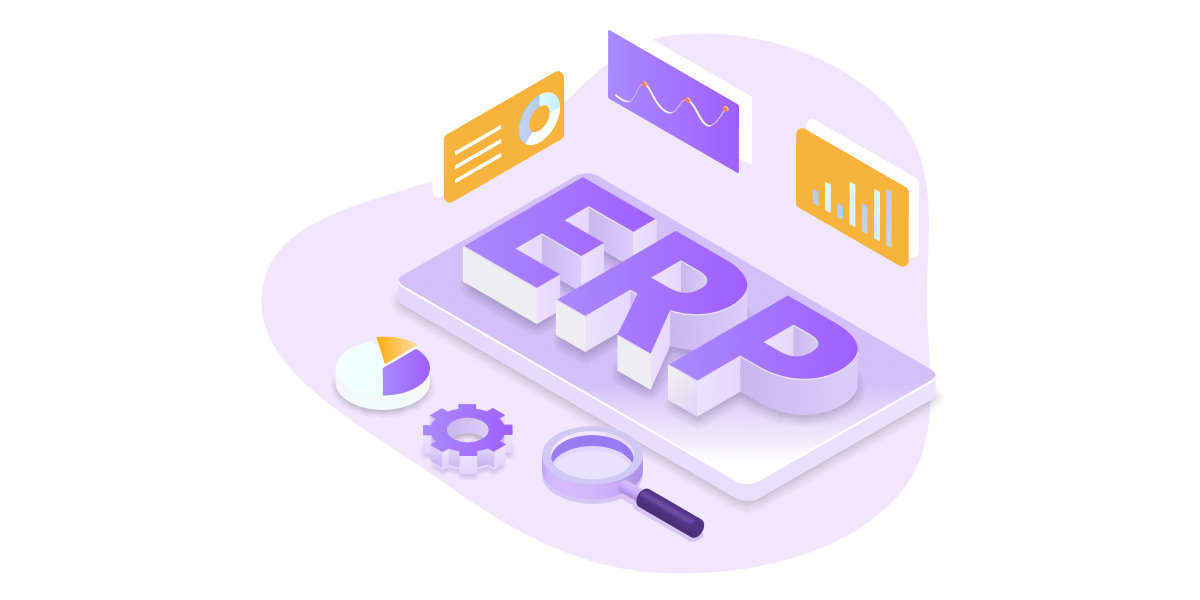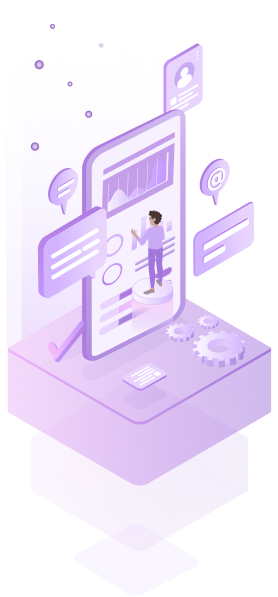In basic terms, what is ERP?
ERP is an acronym for enterprise resource planning. It is a software solution that encompasses all the necessary tools and procedures for operating a thriving business, such as HR, production, logistics, finance, and other functions.
More and more companies are choosing custom ERP (Enterprise Resource Planning) systems to stay ahead in business. Custom ERP solutions have uniqueness as they are tailored to fit the specific needs of each business. Let’s look at how these custom systems are changing the way companies work, react to market changes, and grow. They are much more than just software updates.
A Simple Look at ERP’s History
Have you ever contemplated the journey of contemporary ERP systems? Let’s take an easy-to-understand look at how ERP evolved from a basic idea to the powerful tool it is now.
It all began in the early 1900s. Think about managing work with just paper and pen. This changed when Ford Whitman Harris came up with the economic order quantity (EOQ) model. A simple start, but it marked the beginning of a significant undertaking.
The 1960s were a turning point. Material requirements planning (MRP) tools were created at this time. Combining old ideas with new computer technology, MRP started the shift to digital management. But this was just the start, not the peak.
Later, MRP evolved into MRP II, which brought different tasks like inventory and scheduling together in one system. This showed a new way to manage a business.
By the 1990s, we had ERP systems. These systems did more than just help with manufacturing. They handled everything from money to customer service and hiring. This moved businesses from paper to digital systems that managed everything.
Today’s ERP systems, with cloud computing and AI, show how much we’ve advanced. From Harris’s simple EOQ model to the complex ERP systems of today, we have witnessed a lot of change and growth. What will happen next with ERP? Time will tell, but one thing is sure: ERP is changing fast, just like the technology it uses.
What are Custom ERP Solutions? A Simple Guide
Have you ever heard of ERP and wondered what it means? ERP stands for Enterprise Resource Planning.
Think of it like a powerful and versatile tool that businesses use to manage all their different activities. Now, let’s discuss something special within ERP – custom ERP solutions. What are they, and why are they important for businesses, including ones that might not know much about ERP? Let’s determine.
Custom ERP Solutions: Made Just for You
Imagine you buy a suit. You can get one off the rack, or you can have one tailor-made just for you.
Custom ERP solutions are like the tailor-made suits of the business world. They have a special design to fit the unique needs and processes of a business. Companies make custom ERP systems to measure, unlike standard ERP packages that are more like one-size-fits-all.
What is enterprise management?
Enterprise management refers to contemporary ERP systems that enable businesses to oversee essential daily operations, like inventory management, accounting, human resources, and customer relationship management (CRM).
Enterprise management facilitates the collaboration of various business units by exchanging information through a centralized database.
What is an integrated ERP system?
An integrated ERP system is a combination of an ERP with integrated modules that enable the management of various business processes from a single platform.
ERP integration is the process of connecting separate modules or software systems to a central ERP. These integrations can be first-party or third-party.
Piesoft, for instance, has a range of first-party products that can be integrated with their ERP. She is an example of a third-party ERP integration, capable of connecting with any ERP to add working capital management, inventory management, and supply chain optimization functionality.
Overview of the Industry: Understanding the ERP solutions for businesses
Let’s look at what’s going on in this area, with a focus on the tailored ERP options that are becoming more popular.
The market is getting bigger: First, it’s good to know that the ERP business is growing. More and more companies want software that lets them handle all of their data and operations from one place.
Custom solutions are becoming more popular because companies don’t just want any software these days. They want that are perfect for their needs.
This is what custom ERP systems do. They let companies change the tools to fit what they do and what they want to achieve. Business used to have to change how they did things to fit the tools, but now it’s not necessary.
Why Custom Solutions Are So Popular Right Now: What’s Behind the Trend? Business are more complicated these days, so they need more from their tools. There are also many types of businesses that need software that is unique to them.
Custom solutions are better with new technologies. For example, cloud computing, AI, and machine learning are making ERP systems more powerful and adjustable. She can now do more than just manage data with these technologies. They can also give businesses help and insights.
In the ERP market, businesses can now choose specific modules they need, like finance, HR, or supply chain management. They can put these parts together to make a method that works best for them.
So, why should a business consider a custom ERP solution? Here are a few reasons:
Perfect Fit
Just like a tailor-made suit fits you perfectly, a custom ERP solution fits a business’s specific needs. Every business is different, and a custom ERP system takes into account these unique aspects.
Flexibility and Growth
Businesses change and grow over time. We design custom ERP systems to change and grow with them. This means that as your business evolves, your ERP system can adapt to new challenges and needs.
Efficiency and Productivity
With a system that’s tailored to your specific business processes, tasks can be completed more efficiently. This leads to better productivity, as the system supports your work in the best way possible.
Competitive Edge
Having a system that is specifically designed for your business can give you an advantage over competitors who might be using more general, less specialized systems.
Integration
Custom ERP systems can be designed to work seamlessly with other tools and software your business uses. This makes everything work together smoothly, saving time and reducing errors.
Support and Upgrades
When you have a custom ERP solution, you often get support and upgrades that are specifically tailored to your system. This means better help when you need it and upgrades that make sense for your business.
Deep Dive into the Technology: How Custom ERP Systems Have Changed Things

Custom ERP systems stand out in the world of business software because they are so technologically advanced and flexible. They customize to fit the needs of each business, which is something that standard systems can’t do. We will analyze important technological aspects of systems. We will show how these aspects affect businesses using real-life examples and case studies.
What Makes Custom ERP Systems Technologically Interesting
Modular Design
Custom ERP systems are made using a modular method, which means they are made up of different modules (for example, finance, HR, and inventory management) that can be picked out and changed to fit the needs of the business.
Inventory and production management modules are crucial for manufacturing companies, while service-based businesses prioritize CRM and human resources modules.
Real-Time Data and Analytics
Custom ERP systems give businesses up-to-date data and analytics that they can use to make smart choices.
A healthcare provider used a computer system to track patient information in real-time. This improved patient care and made the business run better.
Integration Capabilities
One of the best things about custom ERP is that it can work well with other software and systems. This merger makes sure that different parts of a business can talk to each other and work well together.
Cloud-Based Solutions
Many unique ERP systems are now in the cloud, which makes them easier to access, lowers IT costs, and makes it easier for people in different places to work together.
Scalability
These systems are scalable, which means they can grow and change as the business does. This makes sure they will be useful and viable in the long run.
Mobile Accessibility
Many custom ERP systems come with mobile access, which lets employees get to important business data and complete tasks while they’re on the go.
What Custom ERP Technologies Mean for Business

Custom ERP systems are more efficient, better at managing data, and more flexible in how they operate. Companies can create a system that aligns with their processes, improving productivity and providing valuable strategic insights.
Market Trends Analyzing: The Future of Custom ERP Systems
These are the newest trends in custom ERP systems. I make the explanation understandable to anyone, regardless of their familiarity with Enterprise Resource Planning.
- Artificial Intelligence (AI): AI is like a smart assistant for ERP systems. It helps in making better decisions by analyzing data. In the future, AI in will get even smarter, making systems more efficient and user-friendly
- Cloud Technologies: Cloud technology means storing and accessing your Enterprise Resource Planning system over the internet, not just on one computer or server. Becoming more popular because it’s flexible and cost-effective. In the future, more systems will move to the cloud, making them accessible from anywhere.
- Data Integration: This is about making sure all the different parts of your ERP system can talk to each other and share information easily. Getting a complete view of their operations is important because it helps businesses. We’ll see more advanced data integration in systems, making them even more powerful.
- Mobile Accessibility: With everyone using smartphones and tablets, systems are becoming more mobile-friendly. This means you can manage your business on the go. Enterprise Resource Planning will continue to add more mobile features.
- Customization and Flexibility: Businesses are unique, and so are their needs. We design to meet these specific needs. In the future, we’ll see even more customization options, making ERP systems fit businesses like a glove.
- Enhanced Security: As handle a lot of important data, security is crucial. Future trends include stronger security measures to protect this data.
Practical Advice for Сlients: Choosing and Implementing Custom ERP Solutions
Assess Your Business Needs
Understand the specific needs of your business. What processes need improvement? What are your long-term goals?
Research and Compare
Look into different ERP vendors. Compare their features, scalability, support services, and costs.
Check for Customization
Ensure the ERP solution can be tailored to your business’s unique requirements.
Competitive Edge
Having a system that is specifically designed for your business can give you an advantage over competitors who might be using more general, less specialized systems.
Plan for Integration
Consider how the ERP will integrate with your existing systems. Seamless integration is key for efficiency.
Seek User-Friendly Solutions
Choose a system that is easy for your team to use and understand.
Prioritize Support and Training
Good vendor support and comprehensive training are essential for successful implementation.
Think Long-Term
Consider not just immediate needs but also future scalability and updates.
Conclusion with a Future Outlook
Custom ERP solutions will continue to improve with AI, cloud computing, and data analytics. These systems will be crucial for businesses. They will enhance efficiency, decision-making, and adaptability to market changes. As technology improves, businesses of all sizes will require solutions to alter how they manage themselves.


